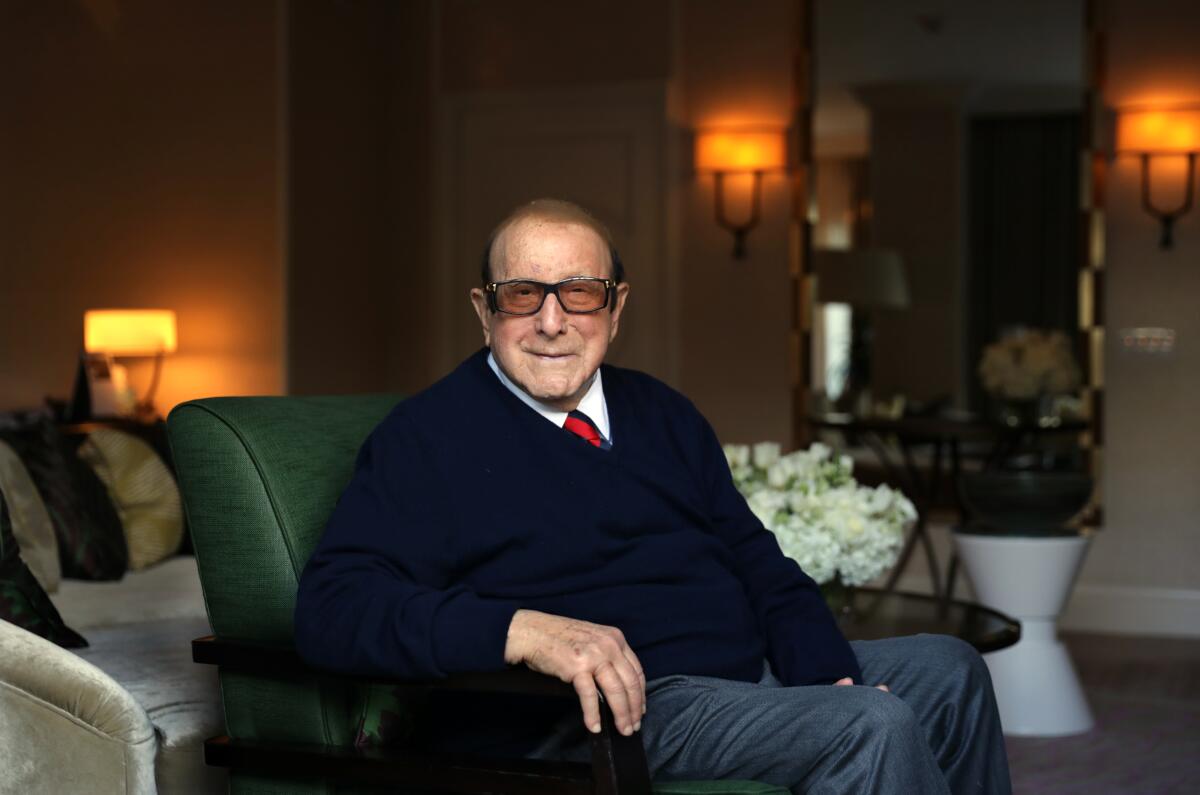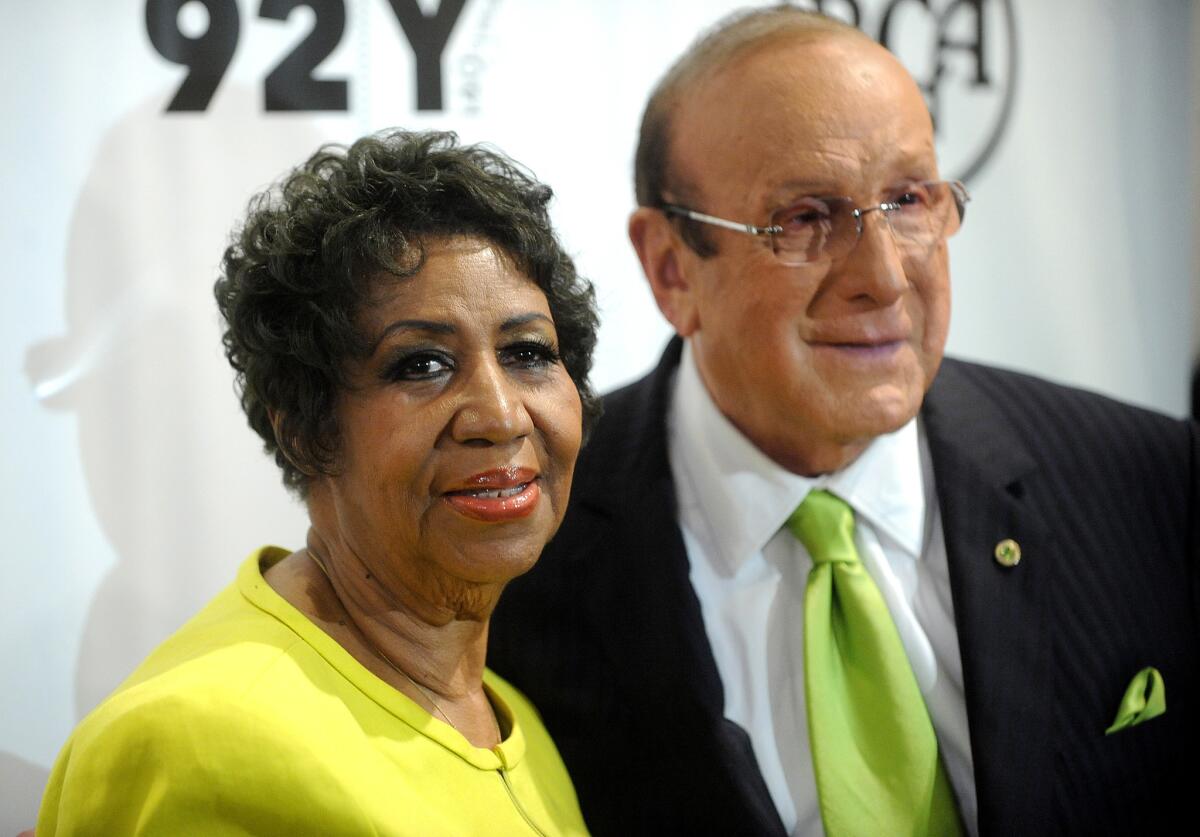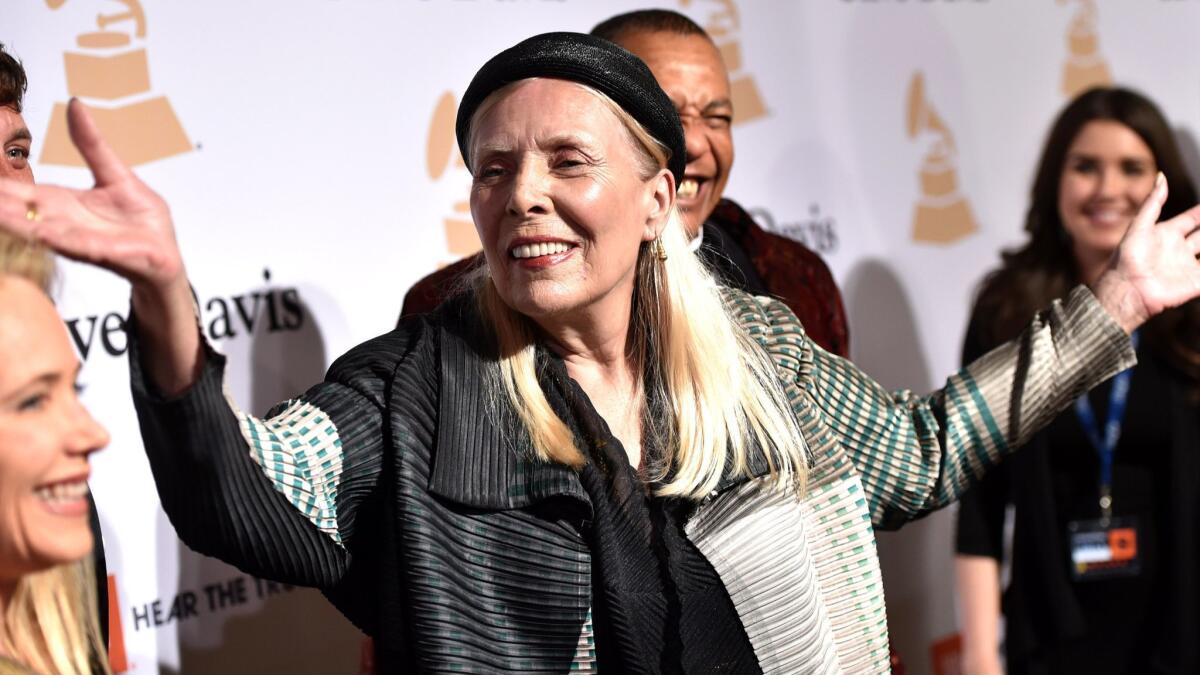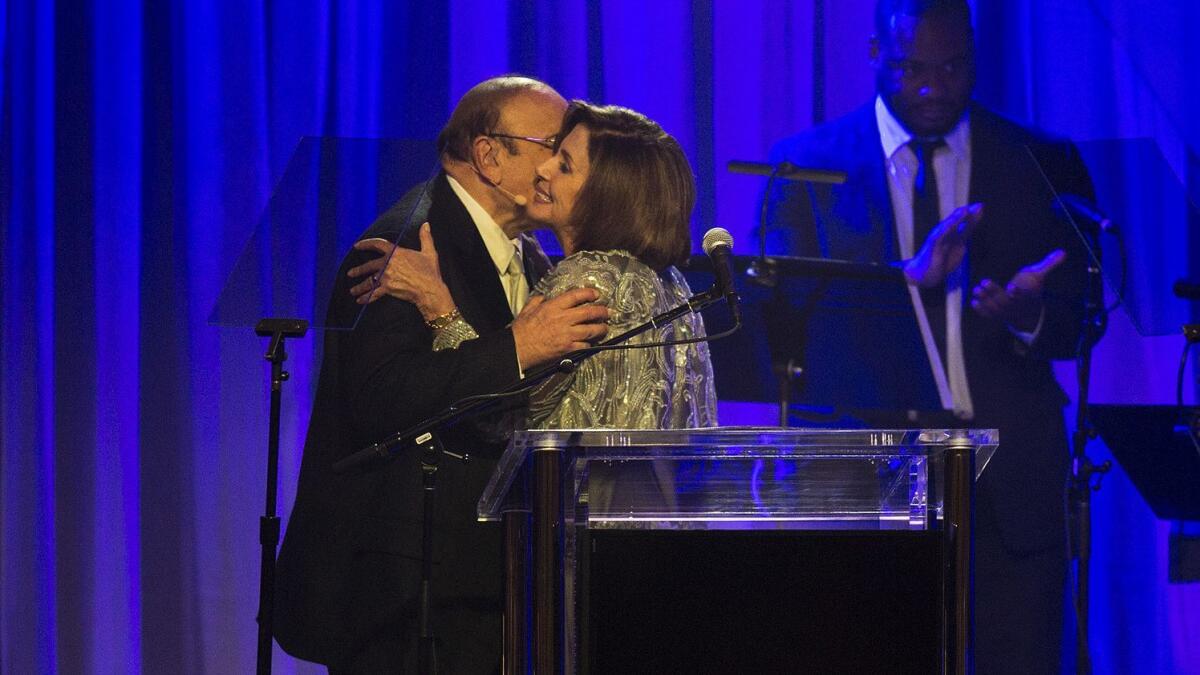Clive Davis, 87, reveals plans to make his own Whitney Houston biopic

- Share via
Clive Davis was not at all eager to talk about the escalating fracas at the Recording Academy in an interview this week, just days before the music-industry organization presents the annual Grammy Awards ceremony Sunday evening at Staples Center.
“I never met Deborah Dugan,” the veteran record executive said of the woman whose recent ouster from the academy’s top leadership position has triggered an explosive war of words involving competing claims of corruption, gender discrimination and rape. “So I know nothing, honestly, involving their interaction.
“You can’t say it’s good” for the business, he continued. “But until we learn more, I can’t appraise the ramifications.”
If he steered clear of the Dugan matter, though, the famously garrulous 87-year-old — well-known for discovering Whitney Houston, for turning Barry Manilow into a star and for orchestrating Aretha Franklin’s comeback in the 1980s — was happy to discuss a number of other topics, starting with the pre-Grammy gala he hosts every year in coordination with the Recording Academy.
Scheduled for Saturday night at the Beverly Hilton, the annual hot-ticket event (with performances by acts Davis wouldn’t identify on the record) is expected as always to attract a one-of-a-kind crowd; among the bold-faced names who have RSVPd so far, he said, were Joni Mitchell, Cardi B, Quincy Jones, Lana Del Rey, Dua Lipa, Cyndi Lauper, Carlos Santana and Speaker of the House Nancy Pelosi, who’s sure to field questions over cocktails regarding that other examination of an alleged abuse of power.
Though “it’s not a party, in general, for politicians,” Pelosi has come for the past 15 years or so, Davis noted with pride, adding that former senator Barbara Boxer would be there on Saturday as well.
And what if he were to receive a request for an invitation from, say, Mitch McConnell? Davis, seated in his suite at the Beverly Hills Hotel, leaned back in his chair as he considered the question.
“Without being rude, I probably would think of another occasion” for the Senate majority leader to attend, he replied. “But not for this party, no. I’m not trying to have equal partisan representation.”

Another guest Davis is excited about is Sean “Diddy” Combs, who’s set to receive the academy’s Industry Icon award in recognition of his long career as a rapper, producer and founder of Bad Boy Records, which he launched in the mid ’90s as a joint venture with Davis’ Arista label.
Asked to recall their first meeting, Davis described being visited in his office by a “young puppy” with a “vision that I’d never heard promulgated before.” Combs, who’d already begun to make his name thanks to his work with Mary J. Blige, stressed to Davis that “the Top 40 should accommodate hip-hop, which it was not doing at all at that time.” Then Combs played Craig Mack’s “Flava in Ya Ear” for Davis.
“Who did I have at the time? I was working with my divas, OK? Whitney and Aretha and Dionne [Warwick],” Davis said. “My contacts would not have drawn me to the street. But it had a great hook,” he added, referring to Mack’s hard-knocking rap track — the first in a string of era-defining hits Bad Boy would go on to release by the likes of the Notorious B.I.G., Mase, 112 and Combs himself under the name Puff Daddy.
It was even easier to get Davis — “a real record man,” according to Manilow, with an unfailing instinct for popular taste — talking about Houston, whose selection this month for induction into the Rock & Roll Hall of Fame led some rock purists to call foul. In Davis’ view, the late pop superstar “eminently deserves” a place in the hall, a case he made in part by pointing out that Rolling Stone — “a rock magazine,” he noted — included Houston’s self-titled 1985 debut in its list of the 500 greatest albums of all time.

He also described Houston as “up there with Aretha” in terms of her influence on younger artists. At the same time, Davis insisted that “the story of Whitney Houston has not been told yet.” He was “very disappointed,” he said, by two recent documentaries on the singer: “Whitney,” which came out in 2018 and was authorized by the Houston estate, and “Whitney: Can I Be Me,” which was released in 2017 without the cooperation of Houston’s family.
He’d been optimistic about “Whitney,” which he said he’d hoped would “overcome” what he viewed as the earlier film’s “sensationalistic” treatment of Houston’s rocky marriage to Bobby Brown. Davis gave a five-hour interview to director Kevin Macdonald, the executive said, and he offered access to his Rolodex and to his archive of Houston material.
But Macdonald ended up building “Whitney,” at least as Davis sees it, around a shocking allegation that Houston was sexually abused as a child. The result, in his mind, is that her “genius” as a musician was given short shrift.
Davis, who currently holds the title of chief creative officer at Sony Music (which distributes Houston’s recordings), has been accused in the past of attempting to gloss over or even to conceal the complicated aspects of Houston’s life. But he said he “has no interest” in “whitewashing” her struggles with addiction or in denying her romantic relationship with Robyn Crawford, who wrote a memoir last year in which she referred to Houston as her “lover.”
Davis, who himself came out as bisexual in his own 2013 bestselling autobiography, simply wants a treatment of Houston’s life that properly explains her musical contributions, he said — which is why he’s “looking forward to putting together” a biopic with a “great writer and a great director.”

His Hollywood ambitions were no doubt stoked by the well-received documentary that spun off his book in 2017 and recently turned up on Netflix, where the movie has “gone viral,” as Davis put it. One way to understand the interest in Davis’ life is to consider that he’s likely the last of his kind: a creative-minded businessman (or a business-minded creative, as he’d surely prefer) in an industry that now relies largely on the wisdom of the algorithm.
Though he’s kept busy in the 2000s with easy-listening covers albums by the likes of Manilow and Rod Stewart, Davis is still beloved by difficult artistes such as Paul Simon and Patti Smith; Lou Reed, who by most accounts hated everybody, spoke fondly of Davis through the end of his life in 2013.
Asked if the admiration of someone like Reed was particularly meaningful to him, Davis said it was. Then he recounted a time decades ago when he invited the legendarily grumpy rocker — “I don’t think he’d mind my telling this story,” he said — to come out to a beach house on Long Island to listen to records as they lay in the sun.
“This was in an era when the sun wasn’t threatening,” Davis said with a chuckle. “And Lou, I’ll never forget it, he said, ‘Clive, you know I can’t go to a beach. If I ever get a tan, my career’s over.’”
More to Read
The biggest entertainment stories
Get our big stories about Hollywood, film, television, music, arts, culture and more right in your inbox as soon as they publish.
You may occasionally receive promotional content from the Los Angeles Times.











